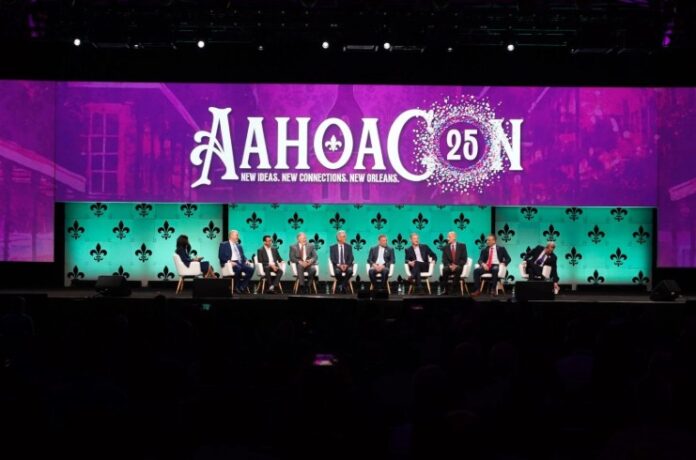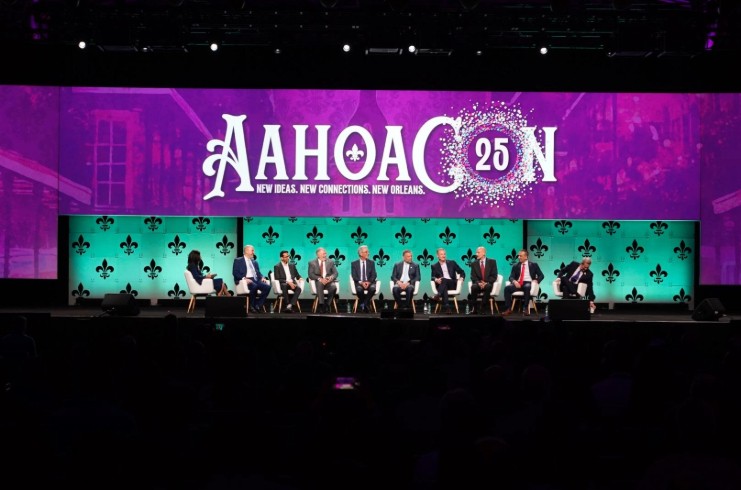
During the last day of AAHOACON25 at the New Orleans Ernest N. Morial Convention Center in New Orleans, Louisiana, AAHOA members gathered to explore the evolving challenges and opportunities within the hospitality industry. Among their top concerns were profitability, development, economic shifts, and more. These pressing topics took center stage during a panel discussion titled “A View From the Top: Shaping the Future of Hospitality,” where nine leading hospitality executives shared their insights. Jagruti Panwala, past chairwoman of AAHOA and president and CEO of Wealth Protection Strategies, moderated the conversation. LODGING was in attendance for the panel.
Panwala introduced the idea that hotel owners are struggling in the current hospitality environment, with challenges including labor shortages and the high cost of construction. Liam Brown, group president, U.S. & Canada for Marriott International, acknowledged some of the headwinds facing the industry, like interest rates, debt, new-build pricing, and more, but emphasized that there are still opportunities within challenging times. Brown said, “Resilience and perseverance are characteristics of [AAHOA members] and a characteristic of our industry.”
Agreeing with Brown, Geoff Ballotti, president and CEO of Wyndham Hotels & Resorts, added that hotel owners remain positive amidst an uncertain environment. Ballotti said, “Talking to all of you over the last three days, there’s never been more uncertainty in terms of development, but there also does not seem to be a lot of concern out there. For the point that Liam raises, the resiliency of select-service has never been more tested, never been more proven than it was throughout COVID. And so, I think there is tremendous optimism still out there.”
Specifically for the extended stay, Greg Juceam, president and CEO of Extended Stay America, detailed how the segment is currently “exactly where it’s always been, which is about 10 points higher than the U.S. hotel industry overall, which has been true for a long time. So, occupancy is there, and it has been.” Juceam stated that fluidity in the space comes from the overall business mix and occupancy types on property, and hoteliers can use that information to remain resilient in any environment, uncertain or otherwise.
Yet this uncertainty in the marketplace is something hoteliers have seen before, specifically during the COVID-19 pandemic and the financial crisis of 2008. Keith Pierce, executive vice president, president of franchise and development for Sonesta International Hotels Corporation, agreed with the assertions made by Panwala, Brown, and Ballotti. “Uncertainty creates a stall basically, but there’s a lot of capital out there,” he said. “And although there is current pressure, certainly from an interest standpoint, I do think that that uncertainty is going to be short-lived. … Uncertainty creates anxiety, but it will pass.”
Zach Gharib, president of Red Roof, weighed in on how his company assists in helping its owners throughout difficult times. “We have to make sure we have a smart incentive, especially new development,” he said, and noted the company itself is in “not only new financing, but we are also on the buying side. That way we make sure to help [owners] in the process, because it’s important.”
And Danny Hughes, president, Americas for Hilton, maintained that company success directly correlates with ownership success. Part of making sure there’s collaboration between both includes “really listening, taking advice, direction, and suggestions from the community.” Hilton does this through advisory councils and questionnaires that keep the company informed on what owners are asking for. “Transparent communication and honesty,” he said, are key to staying successful and navigating through difficult times.
For advocacy efforts, the most important thing hotel owners can do is use their collective voice, said Larry Cuculic, president and CEO of BWH Hotels Group. This applies to speaking with “any group of policymakers, politicians at federal, local, or state levels,” and Cuculic stated that it’s fundamental that these lawmakers are thoughtful about the policies they’re implementing, giving a greater level of certainty in the industry. “We as businesspeople love certainty, and when we’re operating and there’s this cloud or fog, it impacts consumer confidence. It influences business leaders. It influences international inbound travel, and it influences all of us when we’re making decisions,” he noted.
One of the uncertainties impacting hotel owners is tariffs. Dan Hansen, head of Americas development and global head of Hyatt Studios, said tariffs “created a lot of confusion. … I think it’s still trying to wait and see.” He doubled down on the notion that the industry is “a resilient and thoughtful group,” seen throughout the aforementioned pandemic and financial crisis in the United States. “Whether it’s tariffs or any other risk, figure out what works and what doesn’t. It is your capital, it is your family’s capital, it is your personal [capital], but we’re a risk-taking business. Don’t bet it all on one, but think about the longer-term effects … regardless of how the tariff situation is.”
Ritesh Agarwal, chairperson, G6 Hospitality, also emphasized that “the best opportunities are in the uncertain environments.” He noticed that his partners made great investments during COVID, “so my sense of this is a great time to invest and extend your resources because I’m seeing deals and what I consider good deal scenarios.”
To close out the conversation, the panelists also touched on international inbound travel, the importance of clear communication between brands and owners, and practical guidance for hotel owners navigating today’s complex landscape. Looking ahead, the leaders shared advice for the next generation of hoteliers: embrace your work with enthusiasm, stay curious, take risks, and, above all, love what you do.

